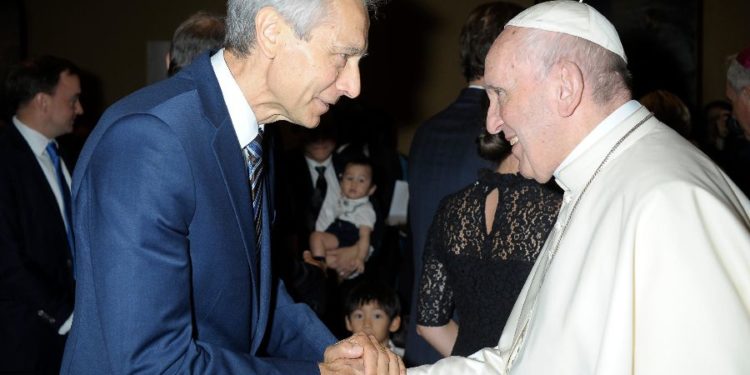Figel’ said that his own uncle disappeared in 1953.
He noted that the chain of events that led to the collapse of communism in Czechoslovakia began in Bratislava, the present-day capital of Slovakia, on March 25, 1988.
On that day, a large crowd assembled for what later became known as the “candle demonstration,” led by Catholic groups. It was the first mass demonstration in defiance of the communist regime since 1969.
“Brutal police force was used against 10,000 protesters praying the rosary and singing state and papal anthems,” Figel’ said. “Yet in November 1989, one and a half years later, half a million citizens prayed the Pater Noster in Prague.”
“The movement towards freedom was unstoppable. It was an annus mirabilis [miraculous year] — a dramatic but peaceful, spiritual revolution, encouraged by the Polish Pope John Paul II.”
“The nation was united in the quest for religious freedom and civil liberties and was successful. This is a historical lesson.”
Speaking about the pope’s Sept. 12-15 trip to Slovakia, Figel’ said he hoped that “Pope Francis will awaken this memory and legacy of Slovakia and the whole of Central Europe.”
He observed that on the very day of the pope’s arrival in Slovakia, “a great Pole will be beatified: the late Cardinal Stefan Wyszyński.”
(Story continues below)
The pope will travel to Slovakia after a brief visit to Hungary to celebrate the closing Mass of the 52nd International Eucharistic Congress.
“The Eucharistic Congress in Budapest should remind us that faith in Jesus is a reason for persecution and even martyrdom in many countries,” Figel’ commented.
For this reason, the establishment in Slovakia of an office for the promotion of international religious freedom is “a great achievement,” Figel’ said, considering that “already three Visegrád neighbors [Poland, Hungary, and the Czech Republic] have active governmental structures and policies in this respect.”
Figel’ suggested that there were “multiple ways” to help foster awareness of religious freedom, including “prayer, humanitarian aid to the persecuted, constructive official development policies, cooperation with churches and pro-religious freedom NGOs like the Caritas, Aid to the Church in Need, Christian Solidarity Worldwide, Open Doors.”
“As EU envoy,” he said, “I was working with them. They provide excellent work for the needy and the persecuted. It is a pity that there is no EU envoy for religious freedom and belief anymore.”
Reflecting on the situation in his homeland, Figel’ said: “Christianity is a religion of love and dignity. Slovakia has deep Christian roots and culture. The spiritual heritage of the two co-patrons of Europe, St. Cyril and St. Methodius, is quoted in the preamble of our state constitution.”
Credit: Source link




